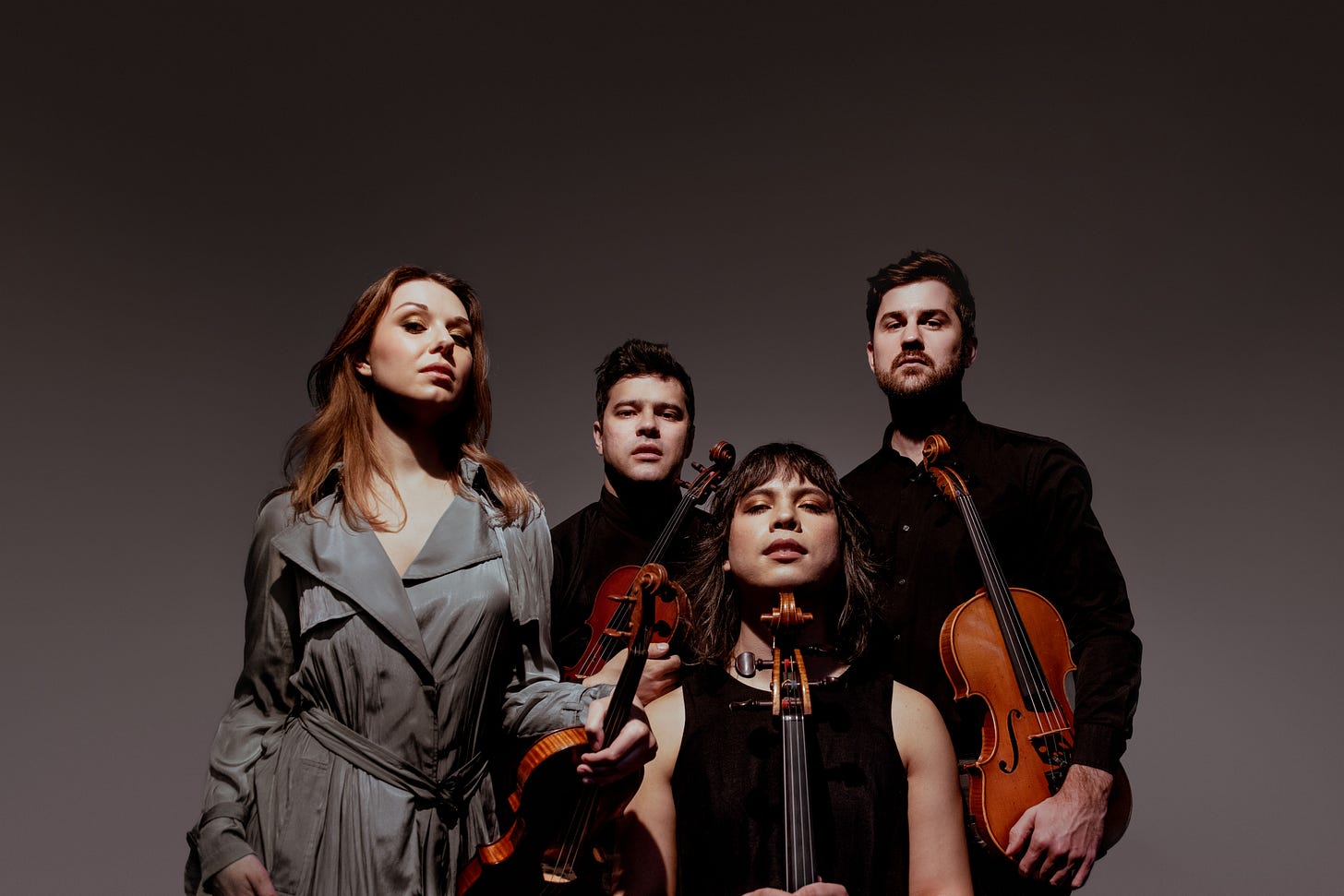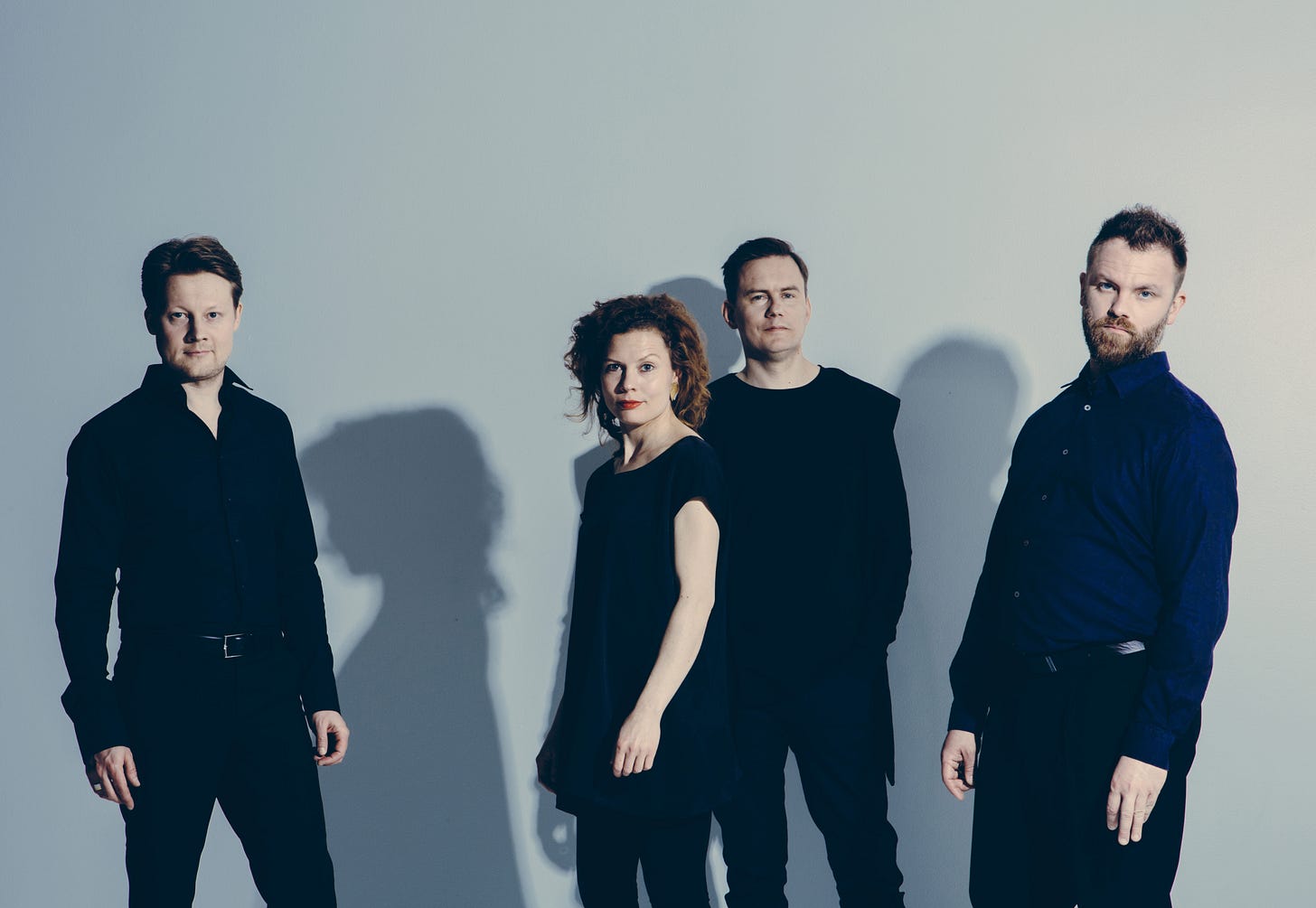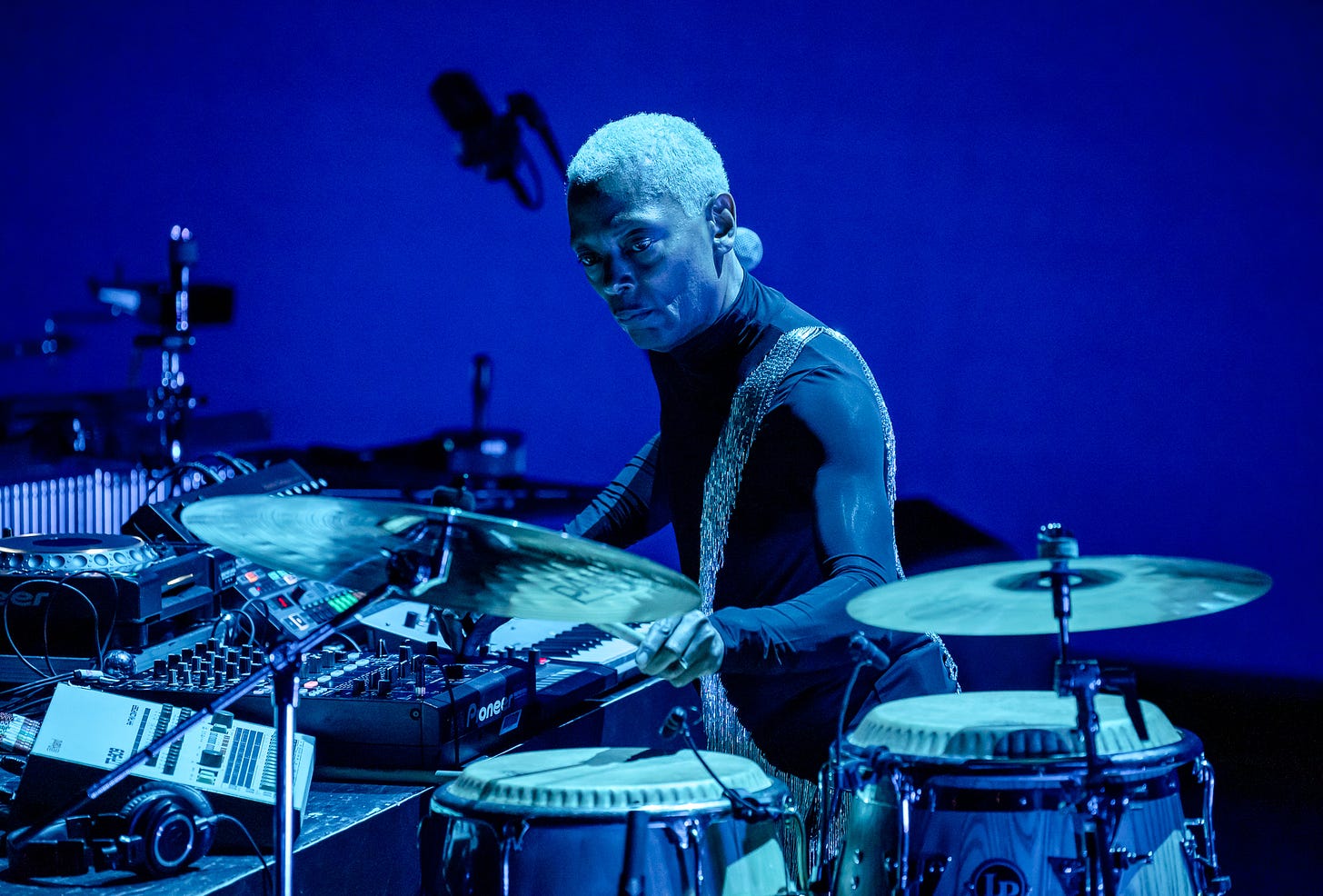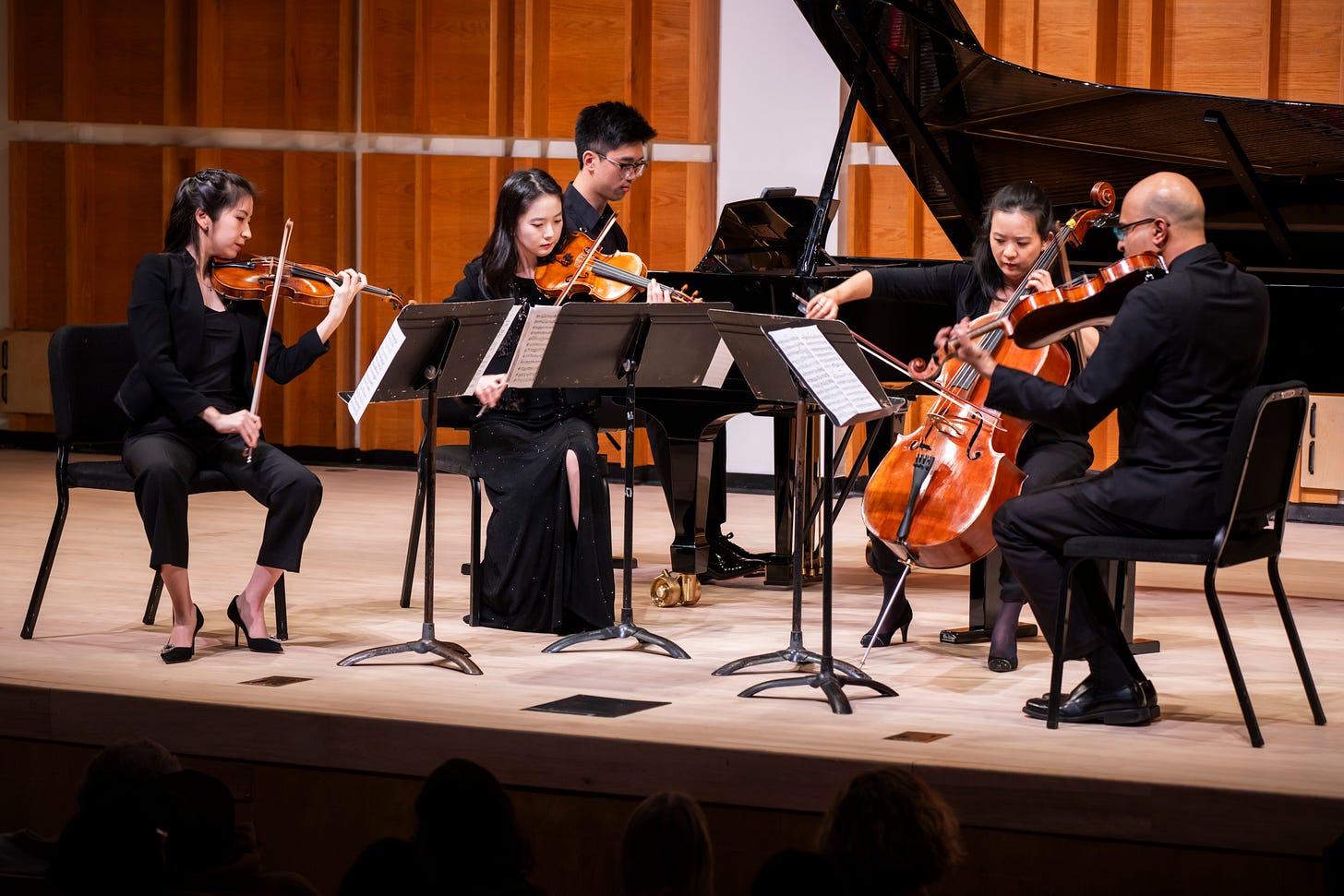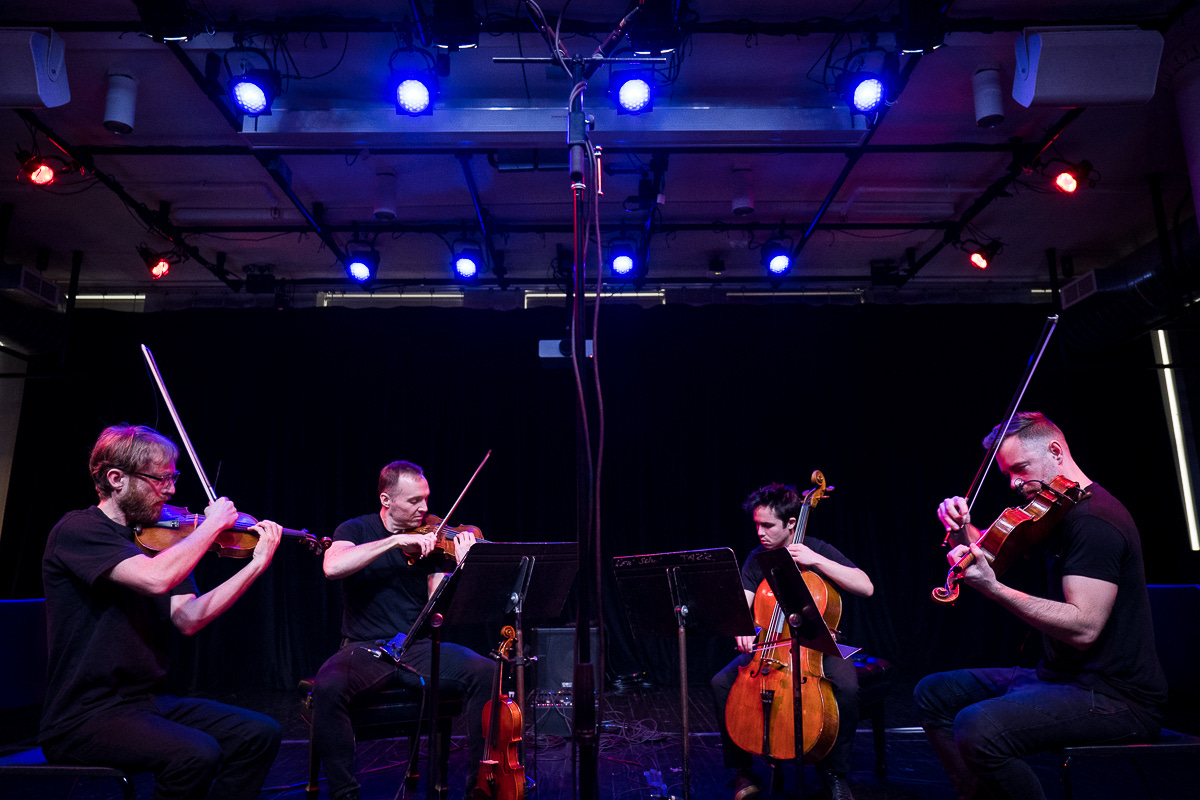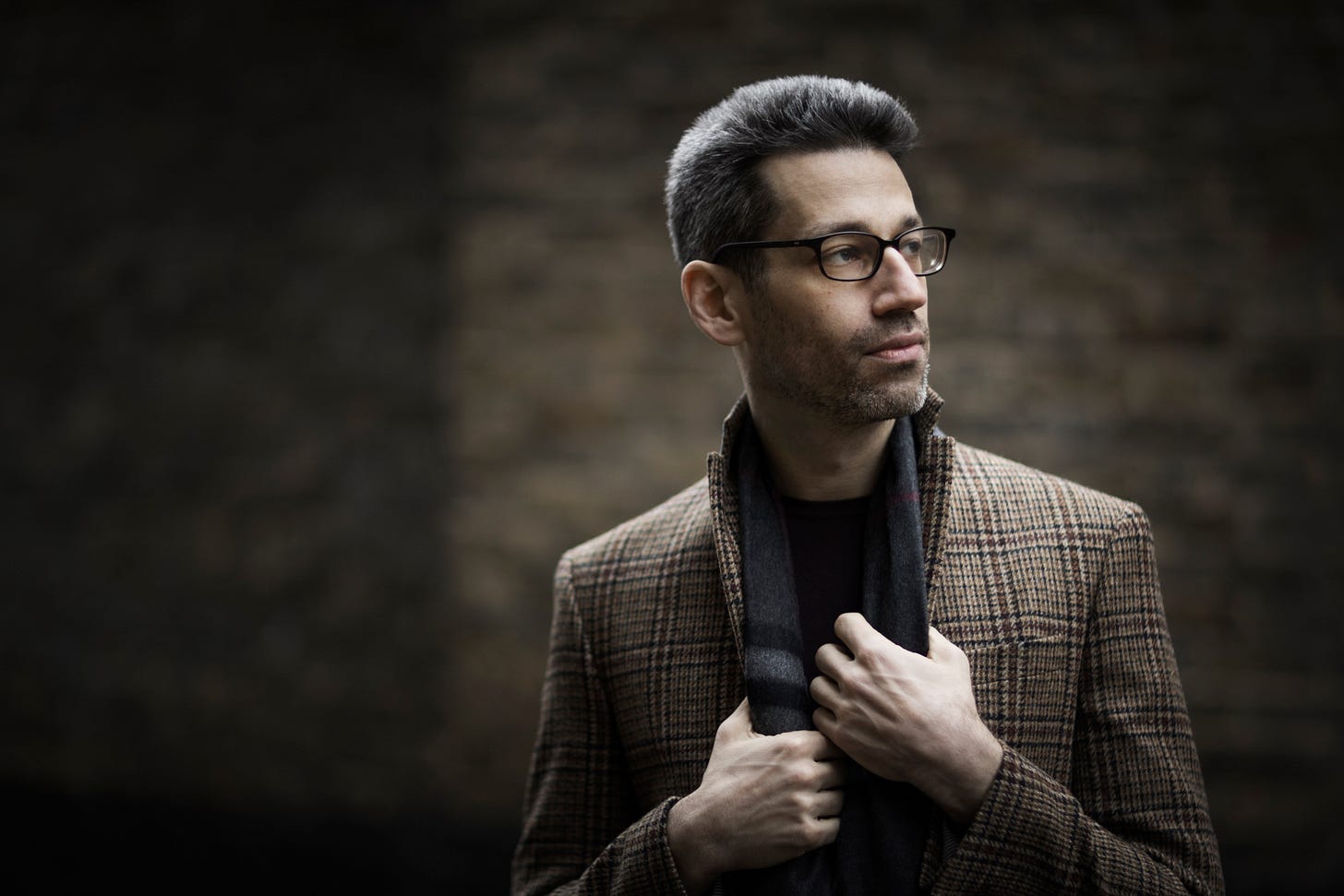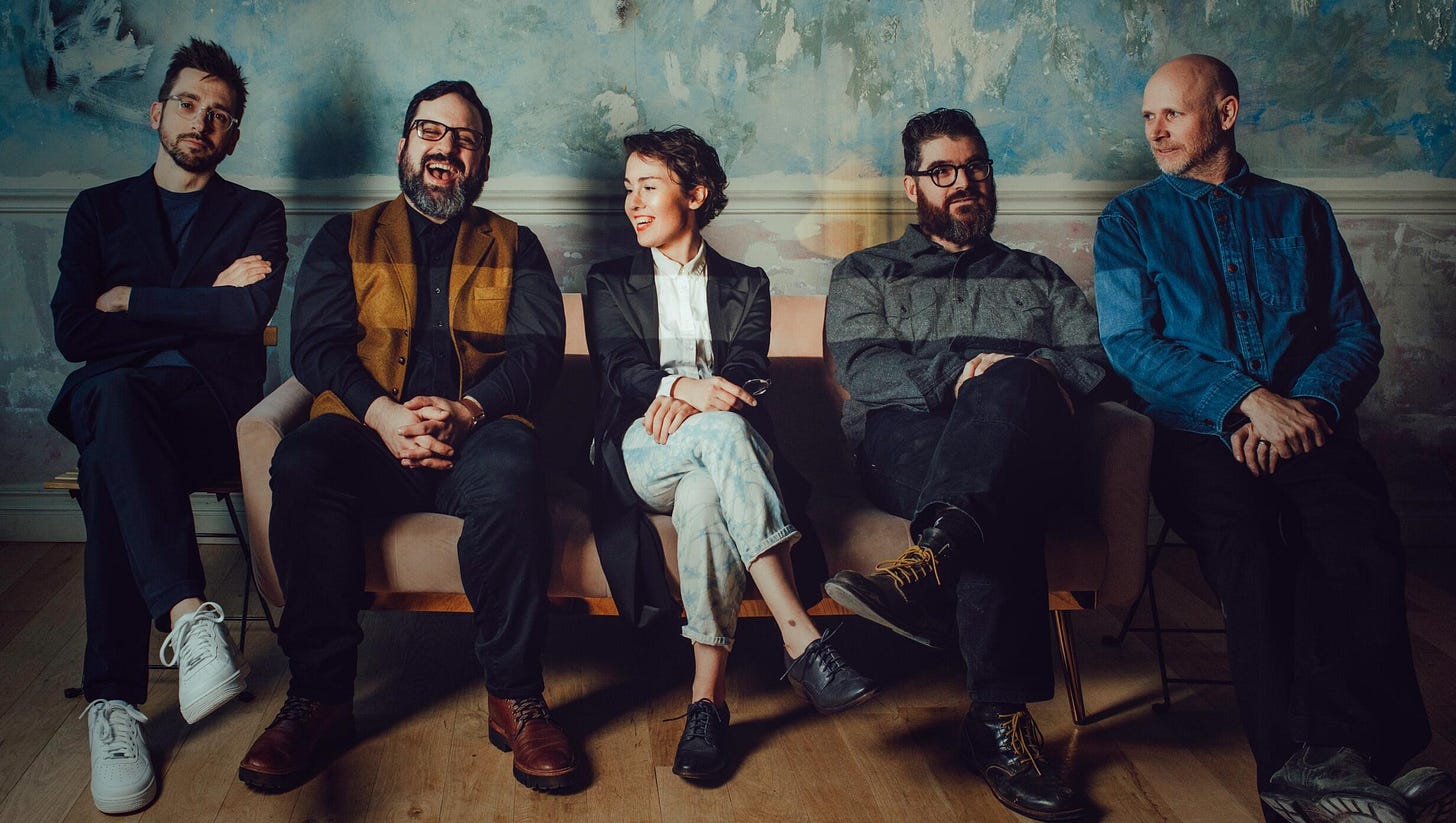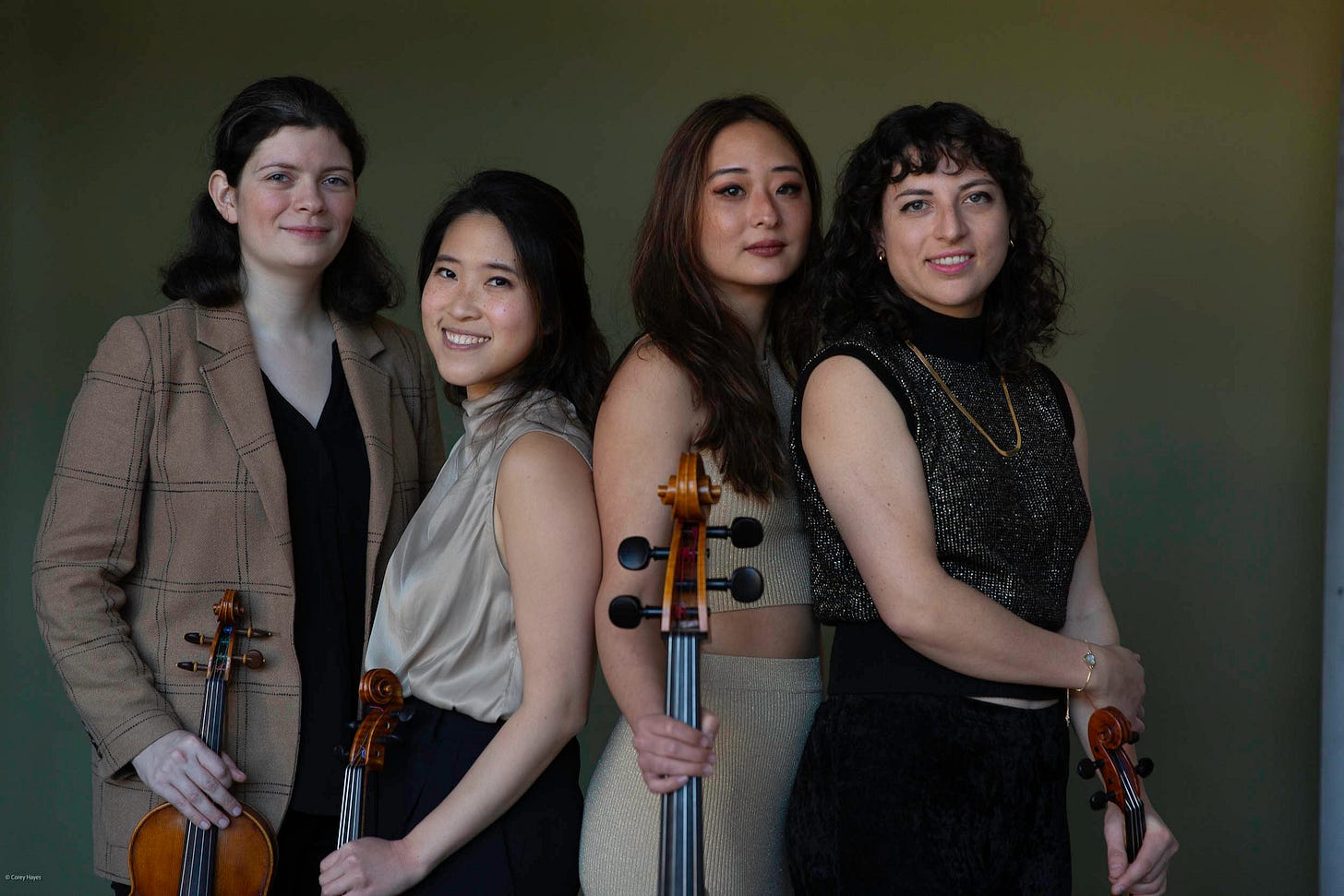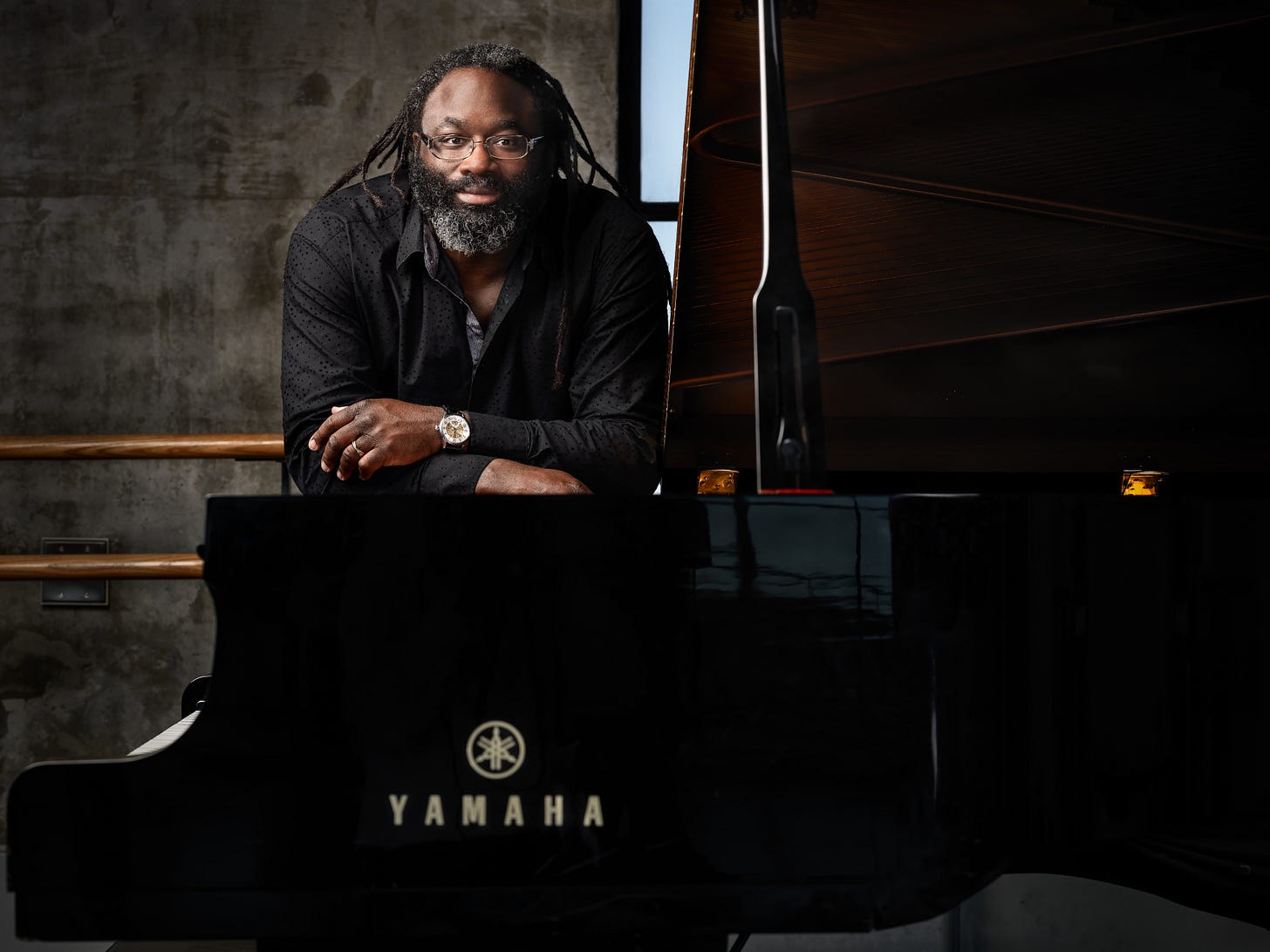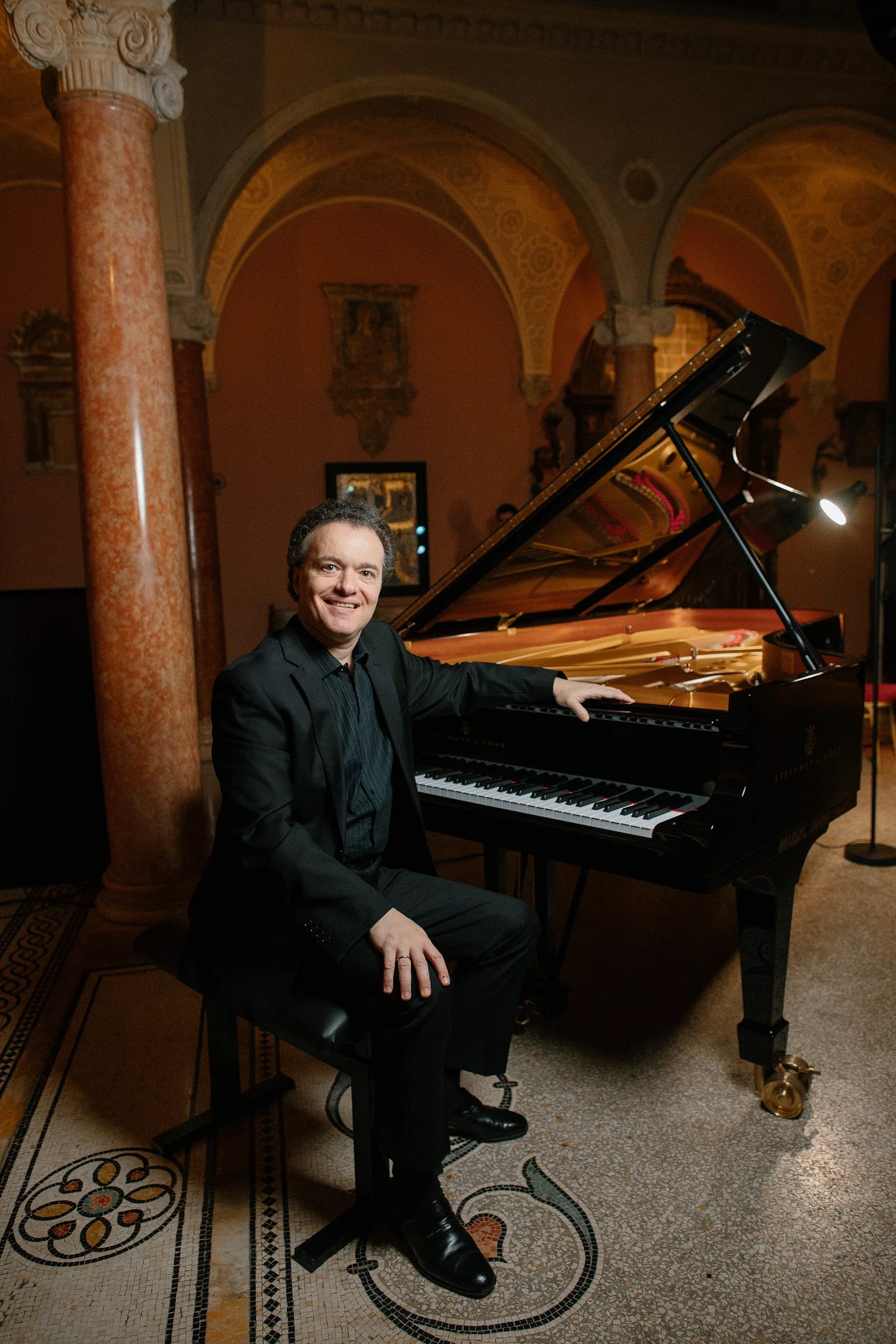The Best Classical Music Concerts in NYC This May — And a Festival That Rethinks the Whole Genre
Schubert sonatas in a crypt, a jazz-fueled fable, and one festival redrawing the boundaries of what classical can be.
May’s classical calendar doesn’t wait for your plans, it just barrels ahead. Long Play Festival returns with 50+ boundary-blurring sets in three days. The NY Phil hands Mahler and a Kate Soper premiere to Dudamel, Jonathan Biss plays Schubert in a Harlem crypt, and Meredith Monk joins Alarm Will Sound for a concert that lingers more than it explains. Add a roaring century-old pipe organ, a puppet-filled Faust, and Kronos Quartet still pushing the string quartet forward. Whether you’re in it for the big statements or the strange detours, there’s something worth showing up for.
Attacca Quartet
Zankel Hall, Carnegie Hall, Midtown — May 1
Grammy-winners Attacca Quartet serve up a fresh program celebrating Mexican composer Gabriela Ortiz, the current star of Carnegie's composer-in-residence series. They'll premiere her new Mujer Ángel alongside the vibrant Altar de Muertos—a colorful journey through Mexico's Day of the Dead traditions that transforms ancient rituals into contemporary sound. Rounding out the evening is Paul Wiancko's LIFT, a piece that manages the magic trick of feeling both centuries old and wholly modern. This is chamber music that speaks directly to 2025 listeners, whether you follow string quartets religiously or just want to hear what happens when classical traditions meet living composers.
Ideal For: Cultural explorers curious about Mexican classical influences, Listeners who want their chamber music with a shot of energy.
Venue Notes: Underground beneath Carnegie's main hall, Zankel's honey-toned wood walls create the perfect listening space where no seat feels distant. It feels like a deluxe recording studio where 599 people somehow got invited to the session.
Meta4: Declarations of Love
The 92nd Street Y, New York, Upper East Side — May 2
Finnish quartet Meta4 makes their NYC mainstage debut with a program that peels apart love in all its messy contradictions with the emotional clarity of a couples therapist. This rare US appearance shows off their signature style: taut, energetic playing delivered on their feet (minus the cellist). Declarations of Love opens with Janáček’s "Intimate Letters,” a string quartet overflowing with obsession, then moves to Sally Beamish’s Nine Fragments—a modern response to Schumann’s A-minor quartet. After that reflection, the program closes with Schumann’s A-minor quartet itself, played complete, its passion and vulnerability fully revealed.
Ideal For: Chamber music fans ready for something beyond the usual suspects, Fans of big feelings, Relationship contemplators who prefer their emotional journeys in musical form.
Venue Notes: Buttenwieser Hall has the warmth of a ballroom and the scale of a salon. An ideal space for chamber music that leans in close.
Long Play Festival 2025
Various Venues, Brooklyn — May 2–4
More than fifty concerts in three days. Long Play is Bang on a Can’s massive festival takeover, where "classical music" gets pushed, pulled, and reimagined beyond recognition. This year’s lineup bounces from Kim Gordon’s raw art-rock set to premieres by Henry Threadgill and Kate Moore, deep dives into Arvo Pärt and Julius Eastman, and a Terry Riley 90th birthday bash with the Bang on a Can All-Stars. If you're curious what the future of classical, and everything around it sounds like, this is your weekend.
Ideal For: Curious listeners, Experimental music fans, Those who like their music without boundaries.
Brooklyn Chamber Orchestra: Rheinberger / Beethoven
St. Ann and the Holy Trinity Church, Brooklyn Heights — May 3
Brooklyn Chamber Orchestra is throwing a 100th birthday party for a pipe organ, and you're invited. The Peabody Memorial Organ, a glorious monster with thousands of pipes, gets to flex its full power with Rheinberger's rarely-performed Organ Concerto No. 1 in F Major, featuring virtuoso Gregory D'Agostino at the controls. For the second act, conductor Philip Nuzzo leads the orchestra through Beethoven’s Eroica—the symphony where he rewrote the rules of classical music and mourned the death of revolutionary ideals. Originally dedicated to Napoleon (before Beethoven furiously scratched out the dedication when Napoleon crowned himself emperor), it’s music that still feels radical 220 years later. Full of defiance, grief, and hope all tangled together.
Ideal For: Anyone who wants to feel what it's like when a century-old pipe organ rattles your ribcage, History buffs into musical rebellion, Brooklyn locals looking for top-tier classical close to home.
Venue Notes: St. Ann's Gothic church is worth the trip alone. Soaring ceilings, stained glass, and acoustics that make every note shine. The century-old organ remains gloriously unrestored, meaning you'll hear it exactly as 1920s listeners did.
Kronos Quartet: Awaken the Future
National Sawdust, Williamsburg — May 3
For nearly five decades, Kronos Quartet has made a career out of asking what a string quartet can be. Awaken the Future, their latest outing at National Sawdust, answers with something forward-looking, collaborative, and a little surreal. They reunite with former cellist Jeffrey Zeigler for a program packed with new voices and unexpected textures: a world premiere from Niloufar Nourbakhsh, known for emotionally charged, high-density soundscapes; glitch and retro obsessed Nicole Lizée; and Peni Candra Rini, the first woman commissioned by Java’s royal court, who folds ancient Javanese traditions into sharp, modern forms. Gabriella Smith’s Keep Going anchors the night with its urgent, pulsing meditation on climate anxiety and collective action. It's not a retrospective, it’s Kronos, still chasing the edge.
Ideal For: Fans of Kronos's boundary-pushing catalog, New music heads, Night out in Brooklyn.
Venue Notes: National Sawdust is that rare Williamsburg spot that still feels more like an idea than a building. The pristine acoustics and compact, cube-like design are built for clarity, even when the performances refuse to fit into boxes.
NY Phil Ensembles: Rare Chamber Works at Merkin Hall
Merkin Hall, Upper West Side — May 4
The NY Phil's chamber series is where things get personal. For the final program of the season, the Sunday afternoon lineup balances familiar names (Rossini, Beethoven) with some picks out of left field, including Kaija Saariaho’s otherworldly Oi Kuu for bass clarinet and cello. The sleeper hit might be Michael Colgrass’s Variations for Four Drums and Viola—a boldly imaginative piece that gives percussionist Christopher Lamb space to flex his expressive range beyond precision alone. With fifteen Philharmonic musicians featured, it’s essentially a chamber music all-star team.
Ideal For: NY Phil regulars curious to hear their favorite musicians in a different light, Contemporary music skeptics looking for a point of entry, Anyone craving a Sunday afternoon that feels both relaxed and rewarding.
Venue Notes: Merkin Hall’s clean, resonant acoustics and just-right scale make it ideal for music that lives in detail. You’ll hear textures here that would blur in a bigger hall.
JACK Quartet: Austin Wulliman's Escape Rites
Miller Theatre, Columbia University, Upper West Side — May 6
If you missed the JACK Quartet last month at the Americas Society, here's your chance for an even more intimate experience, a free concert that puts you right on stage with the quartet. This time, they're turning the spotlight on one of their own, with violinist Austin Wulliman's compositions taking over the entire program. Celebrating his upcoming album Escape Rites, the evening showcases Wulliman's knack for weaving emotional narratives through both familiar and experimental sounds. The best part? You'll catch every musical gesture up close while enjoying a complimentary drink.
Venue Notes: The space on the Columbia University campus has an almost workshop-like feel, where composers and musicians explore ideas freely. Small enough to feel experimental, big enough to feel like it matters.
Ideal For: Budget-conscious music lovers (it's free!), Anyone curious about composers performing their own work, Tuesday plans that feel cultured but casual.
Jonathan Biss: Schubert Final Sonatas + New Commissions
Church of the Intercession, Harlem — May 7-9
There’s something faintly transgressive about sipping a negroni in a crypt while waiting for Jonathan Biss to play Schubert’s final sonatas. And yet, here we are: three nights under Harlem’s Church of the Intercession, where mortality and music share the bill. Biss pairs these late Schubert works—written in the final year of the composer’s life—with new commissions that echo their emotional depth while carving entirely new paths. Tyson Gholston Davis delivers clarity and visual drama in ...Expansions of Light. Alvin Singleton stretches silence into tension with his signature restraint and mischief. And Tyshawn Sorey, fresh off a Pulitzer win, channels the complexity of history, grief, and improvisation into sound. The whole setup feels more séance than recital. Intimate, disarming, and just strange enough to change how you hear the piano.
Ideal For: Listeners who want to get lost (in a good way), Anyone craving music that gets under your skin and stays there.
Venue Notes: The Crypt under The Church of the Intercession is exactly what it sounds like—stone walls, underground acoustics, and an atmosphere that makes every note feel like a confession. Each performance begins with a pre-show reception featuring food and cocktails from Via Carota, adding a little ritual (and really good drinks) to the experience. It's the perfect setting for music that hovers between the earthly and the divine.
Sō Percussion
BAM Fisher, Fishman Space, Downtown Brooklyn — May 7–10 & May 14–17
This May, Sō Percussion turns BAM Fisher into a two-week sound lab, mixing precision, play, and serious range. Week one features Who Turns Out the Light, a staged performance with Pulitzer winner Caroline Shaw, drawing from their recent albums Rectangles and Circumstance and Let the Soil Play Its Simple Part. Shaw’s duo Ringdown (with Danni Lee Parpan) also joins, bringing warped art-pop into the mix. Week two invites Helado Negro and Kate Stables (This Is the Kit) for a set of new collaborations and reimagined songs, filtered through Sō’s arsenal of rhythm and resonance. It’s not classical, not pop, just deeply inventive music unfolding in real time.
Venue Notes: The Fishman Space inside BAM Fisher is a black-box room with excellent acoustics and a shape-shifting setup that blurs the line between stage and audience. It’s spare, minimal, and made for artists who like to break form while keeping things close.
Ideal For: Adventurous listeners, Percussion nerds, Indie-pop fans, And anyone curious about what happens when genre labels get left at the door.
Samuel Torres's A Dance for Birds with Bergamot Quartet & Lucía Pulido
National Sawdust, Williamsburg — May 9
Forget everything you thought you knew about “chamber music” for a minute. Samuel Torres's A Dance for Birds turns the form inside out, placing congas at the center of a nine-movement migration story where rhythm becomes the narrator. Commissioned by Chamber Music America, this suite doesn't politely ask genres to shake hands, instead it throws Afro-Colombian traditions, Cuban rumba, jazz, and contemporary classical elements into the same room and lets them figure it out. The result is something that breathes and moves with genuine purpose. Torres's ensemble is joined by the razor sharp Bergamot Quartet and Colombian vocalist Lucía Pulido, whose voice can convey generations of memory in a single phrase.
Ideal For: Curious listeners, Genre agnostics, Fans of Afro-Latin rhythm.
Nils Frahm
Kings Theater, Flatbush, Brooklyn — May 9
Yeah, I know Nils Frahm doesn’t scream "classical concert." That’s kind of the point. His ambient-electronic piano sets sit somewhere between neoclassical to chill playlist fodder, yet nothing quite captures what happens when you’re in the room. I saw him a few years back and felt like I’d wandered into someone else’s lucid dream—something so meticulously constructed, yet weirdly emotional. Frahm drifts between upright piano and analog synths like he’s following his instinct more than a score, layering subtle loops with harmonics and bass. What you get isn’t showmanship or flash but rather atmosphere: foggy, slow-building, and somehow full of feeling. If you’ve ever wondered what happens when classical chops collide with a love for tech and sound design, this is your answer.
Ideal For: Big night out, Anyone curious about what happens when classical training meets electronic experimentation.
Venue Notes: Kings Theater is a restored 1920s movie palace with ornate ceilings and great acoustics. The baroque grandeur of the space creates a fascinating contrast with Frahm's modern sound explorations.
Heartbeat Opera presents: Faust
Baruch Performing Arts Center, Kips Bay — May 13-25
Heartbeat Opera doesn’t care for polite revivals. They rip things up and rebuild them with their unbound creativity. This time it’s Gounod’s Faust, reworked into a sharp, 100-minute wild ride that asks: what happens when a brilliant man sells his soul and still can’t stop messing things up? Sung in French with new English dialogues, this production follows the tragic ripple effects when aging scholar Faust (Orson Van Gay II) trades his soul for youth, uses that second chance spectacularly poorly, and leaves young Marguerite (Rachel Kobernick) and her community in ruins. John Taylor Ward makes a devilishly watchable Mephistopheles, while director Sara Holdren strips away operatic excess to reveal the human costs of unchecked male ego. Add some puppets, a lean chamber orchestra, and tight storytelling, and this Faust reboot feels like a lost classic that's been given the remaster it deserves. No opera experience required.
Ideal For: Opera fans ready for a fresh take on a classic, Theater lovers curious about opera's potential, Anyone who enjoys watching the devil work his magic.
Venue Notes: Baruch Performing Arts Center offers a focused, no-frills space that keeps the energy tight and the drama close. Pay-what-you-want tickets start at just $10, making this surprisingly affordable.
City Lyric Opera: Black Water / Savior
Sheen Center for Thought and Culture, NoHo — May 15-17
This double bill from City Lyric Opera doesn’t just pare back operatic excess, it digs straight into the psychological core. Two chamber operas centered on women confronting systems determined to drown their voices. Black Water, composed by Jeremy Beck and based on Joyce Carol Oates’s novella, offers a haunting internal monologue in the final moments of a young woman’s life, trapped in a sinking car with echoes of Chappaquiddick. In Savior, Amy Beth Kirsten reimagines Joan of Arc’s martyrdom through a charged, minimalist vocal trio—equal parts ritual, lament, and resistance.
Ideal For: Fans of chamber opera with teeth. Listeners drawn to spare, emotionally intense storytelling.
Venue Notes: The Frank Shiner Theater at the Sheen Center is an intimate, modern black box in NoHo with clean lines and strong acoustics—ideally suited to psychological, small-scale opera.
Calder Quartet & Timo Andres
High School of Fashion Industries, Chelsea — May 17
The Calder Quartet joins forces with composer-pianist Timo Andres for a program straddling two centuries of chamber music. The centerpiece is Andres' brand new piano quintet The Great Span, receiving its NY premiere after initial performances on the west coast. Andres—a Brooklyn-based composer with a knack for music that feels both contemporary and warmly familiar—will handle the keyboard duties himself. The program creates a fascinating dialogue across time, opening with Schubert's compact but potent Quartettsatz, followed by Ann Southam's Remembering Schubert (a musical conversation with the past), before closing with Debussy's sole string quartet—a revolutionary work that still sounds remarkably fresh 130 years later.
Ideal For: Contemporary music enthusiasts who don't fear the classics, Debussy devotees, Anyone who enjoys watching composers perform their own works.
Venue Notes: This concert takes place at the High School of Fashion Industries (225 W 24th St), not the originally planned Washington Irving location.
Awadagin Pratt, piano
The 92nd Street Y, New York, Upper East Side — May 18
Awadagin Pratt has played Carnegie Hall, the White House, and even Sesame Street (and honestly, he might be more proud of the last one). But what sticks with you isn’t the résumé, it’s the way he plays like he’s chasing something just out of reach. Trained as a pianist, violinist, and conductor (the first-ever to get diplomas in all three at Peabody Conservatory), Pratt brings a wide-open perspective to music that a lot of performers flatten into routine. This recital leans heavy into the big, Romantic sounds he’s known for: Brahms, Franck, full-heart-on-sleeve material. But it’s less about polish and more about more about pulling you into the worlds he builds. Come ready to step inside and stay awhile.
Ideal For: Recital-goers, Anyone overdue for a concert that actually moves you, or if you're curious what happens when technical mastery meets vulnerability.
Venue Notes: Kaufmann Concert Hall at 92NY is one of the city's great rooms for chamber music, talks, and performances that actually feel personal. With 150 years of history behind it, the hall has hosted everyone from world-class soloists to cultural icons. A place where ideas and artistry collide.
Beethoven Trilogy III: Late Period
Alice Tully Hall, Lincoln Center — May 18
Beethoven's late quartets are the Return of the Jedi of his compositional journey: transcendent, otherworldly, and breaking all the rules he once mastered. The Calidore String Quartet takes on the monumental Op. 131 in C-sharp minor—a seven-movement fever dream that presses on without stopping for breath. They'll follow with his Op. 135, the last thing Beethoven ever finished, where he scrawls “Must it be? It must be!” like a man arguing with the universe and refusing to lose. These pieces represent Beethoven at his most profound and personal, written when completely deaf yet somehow hearing music beyond what his ears could perceive. Catch this finale at Alice Tully Hall to experience Beethoven's ultimate evolution.
Ideal For: Classical newcomers, String quartet fans, and anyone who likes their Beethoven with more chaos, less candlelight.
Venue Notes: Alice Tully Hall is Lincoln Center’s most inviting concert space. Sleek, acoustically pristine, and just the right size to make even the quietest chamber moments feel immediate.
Cécile McLorin Salvant: Ogresse
Zankel Hall at Carnegie Hall, Midtown — May 21
Cécile McLorin Salvant’s Ogresse isn’t here to comfort you. This 80-minute murder-ballad-meets-musical-fable scored for chamber orchestra and sung entirely by Salvant herself, tells the story of a forest-dwelling outsider with an appetite for flesh and an even deeper hunger for connection. Ogresse is part monster, part metaphor—a vessel for desire, rage, and loneliness. Through her, Salvant rewrites the female narrative, not with empowerment slogans, but with something thornier: contradiction, vulnerability, and the right to be complicated. From her unnervingly beautiful vocals to Darcy James Argue’s orchestrations, which slide between seductive lushness and discomforting dissonance, every moment resists easy resolution. Salvant wrote the music, designed the costumes and visuals, and embodies every role. One night only at Zankel Hall.
Ideal For: Curious listeners. Big night out. Fans of genre-crossing storytelling, Jazz lovers who want something deeper than standards.
Dudamel Conducts Stravinsky, Glass & Soper
Wu Tsai Theater / David Geffen Hall, Lincoln Center — May 22-27
Want to see the NY Phil's future before Dudamel officially takes the reins? Here’s one of two chances in May. Stravinsky, Soper, Glass—three composers with three very different answers to what orchestral music should do. Dudamel opens with Stravinsky’s Symphony in Three Movements, a rhythm-forward firework show full of jump cuts, grooves, and the swagger of mid-century America. Then comes the world premiere of Kate Soper’s Orpheus Orchestra Opus Onus, a chaotic, brainy one-woman opera that drags the myth of Orpheus through the musical canon and out the other side. Soper stars as a time-warped narrator skewering Western music’s legacy in a piece that’s as theatrical as it is musical. To close, Philip Glass’s Symphony No. 11 churns with thick strings, darting arpeggios, and percussion that won’t sit still. Less a climax than a spinning top that refuses to fall. It’s relentless, strange, and unexpectedly joyful.
Venue Notes: The renovated David Geffen Hall/Wu Tsai Theater was optimized for sound quality. New features like seating behind the stage offer a new perspective while the welcoming lobby is perfect for people watching and roaming around with a pre-concert drink before settling in.
Ideal For: Date night, Classical music fans who appreciate both old-school masterpieces and ink-still-wet premieres, Glass enthusiasts (you know who you are).
Evgeny Kissin and Friends: The Shostakovich Sonatas
Stern Auditorium / Perelman Stage, Carnegie Hall, Midtown — May 28
This is Shostakovich's emotional autobiography, told through three sonatas and performed by four musical superheroes. Piano titan Evgeny Kissin (the guy who could play Rachmaninoff concertos before he could drive) hosts a string dream team to tackle Shostakovich's complete sonata collection—just three works spanning his entire creative life. The evening begins with the Cello Sonata from 1934, written when the composer was young and still publicly optimistic, though Stalin's shadow was already looming. French cellist Gautier Capuçon brings his old-soul sound to this youthful work. Next comes legendary Latvian violinist Gidon Kremer with the 1968 Violin Sonata—a middle-aged composer's response to fascism and his own mortality. The night closes with Shostakovich's final completed work, the haunting Viola Sonata from 1975, performed by Ukrainian viola master Maxim Rysanov. Written weeks before the composer's death, it's basically Shostakovich's musical farewell letter, ending with a movement that quotes Beethoven's "Moonlight" Sonata while slowly dissolving into silence. Tissues recommended.
Ideal For: History buffs fascinated by Soviet-era artistic resistance, Anyone who appreciates musical autobiography, Those ready to hear how one composer's voice evolved from youthful fire to final farewell.
Venue Notes: Carnegie’s main hall has earned its reputation for rich acoustics, a sense of occasion, and just enough old-school formality to make any night feel bigger. Just watch out for the partial view seats.
Dudamel Leads Mahler’s Seventh
Wu Tsai Theater / David Geffen Hall, Lincoln Center — May 29-Jun 1
Mahler’s Seventh is the kind of piece that resists a clean summary. Part nocturne, part hallucination, part brass-fueled victory parade. It’s shapeshifting music, written at the height of Mahler’s creative volatility, and the NY Phil is handing it to Gustavo Dudamel to close out the season. This performance is less about understanding Mahler than about experiencing him: eerie whispers, sudden outbursts, and strange moments that feel like you’ve stumbled into the middle of someone else’s dream. If you’ve ever wanted to say you “get” Mahler without wading through his entire catalog, this is the symphony to hear live.
Ideal For: Date night, Culture weeknight with a friend who “doesn’t get classical” (yet), Curious Mahler first-timers who want one symphony that does everything.
Meredith Monk & Vocal Ensemble with Alarm Will Sound
Merkin Hall, Upper West Side — May 30
“Influential” is the word that always comes up with Meredith Monk, and sure, it fits. But it barely scratches the surface. For over sixty years, she’s built a body of work that doesn’t sit neatly in any one form: it’s part composition, part choreography, part architectural in how it moves through space. At Merkin Hall, she brings together her Vocal Ensemble and the 20-piece genre-bending ensemble Alarm Will Sound for a program that spans her career, including Night, Realm Variations, and the premiere of an instrumental suite from Indra’s Net, her latest large-scale work. She crafts her music as a counterweight to modern noise: an invitation to slow down, pay attention, and experience time on a more human scale.
Ideal For: Curious listeners who’ve heard the name but haven’t made the leap, Longtime Monk followers, Anyone interested in music that doesn’t explain itself but stays with you anyway.
Evgeny Kissin & Friends: A Shostakovich Summit at Carnegie
Stern Auditorium / Perelman Stage, Carnegie Hall, Midtown — May 31
Evgeny Kissin doesn’t do half-measures, and this Shostakovich takeover at Carnegie Hall is pure all-in. He’s bringing some heavy hitters with him—violinist Gidon Kremer, cellist Giedrė Dirvanauskaitė, and a stacked vocal lineup featuring Susanna Phillips and Sasha Cooke—and for bonus points, the Kopelman Quartet makes their Carnegie debut, carrying a direct line back to the composer himself. The setlist pulls from all corners of Shostakovich’s emotional map: the biting sarcasm of Four Verses of Captain Lebyadkin, the haunted wartime Piano Trio No. 2, the aching From Jewish Folk Poetry, and his searing Piano Quintet. If you know Shostakovich’s chamber work, you know it’s where his mask slips. All the fury, heartbreak, and dark humor flood out.
Ideal For: Chamber music enthusiasts, Shostakovich fans who know the real battles are fought in small rooms, not on big stages.
Talea Ensemble: Talea Encores
Church of St. Luke & St. Matthew, Brooklyn — May 31
Talea's season finale strips away the ensemble to spotlight solo works from composers they've championed all year. Think of it as the director's cut—revealing the unvarnished musical ideas that powered their full ensemble performances. Their "Talea Encores" series has become a spring ritual since 2022, highlighting musical relationships rather than just moving on to the next commission. The stunning acoustics of St. Luke & St. Matthew provide the perfect setting for these naked musical moments, where you can track every nuance without the full group's density.
Ideal For: Contemporary music fans, Solo performance enthusiasts, Those curious about classical music's cutting edge without the intimidation factor.
Venue Notes: Built in the late 1800s and rebuilt after multiple fires, St. Luke and St. Matthew is all arches, height, and echo. A Romanesque landmark with a history as layered as its acoustics.






